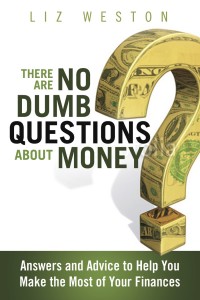 Do you have questions about money? Here’s a secret: we all do, and sometimes finding the right answers can be tough. My new book, “There Are No Dumb Questions About Money,” can make it easier for you to figure out your financial world.
Do you have questions about money? Here’s a secret: we all do, and sometimes finding the right answers can be tough. My new book, “There Are No Dumb Questions About Money,” can make it easier for you to figure out your financial world.
I’ve taken your toughest questions about money and answered them in a clear, easy-to-read format. This book can help you manage your spending, improve your credit and find the best way to pay off debt. It can help you make the right choices when you’re investing, paying for your children’s education and prioritizing your financial goals. I’ve also tackled the difficult, emotional side of money: how to get on the same page with your partner, cope with spendthrift children (or parents!) and talk about end-of-life issues that can be so difficult to discuss. (And if you think your family is dysfunctional about money, read Chapter 5…you’ll either find answers to your problems, or be grateful that your situation isn’t as bad as some of the ones described there!)
Interested? You can buy this ebook on iTunes or on Amazon.